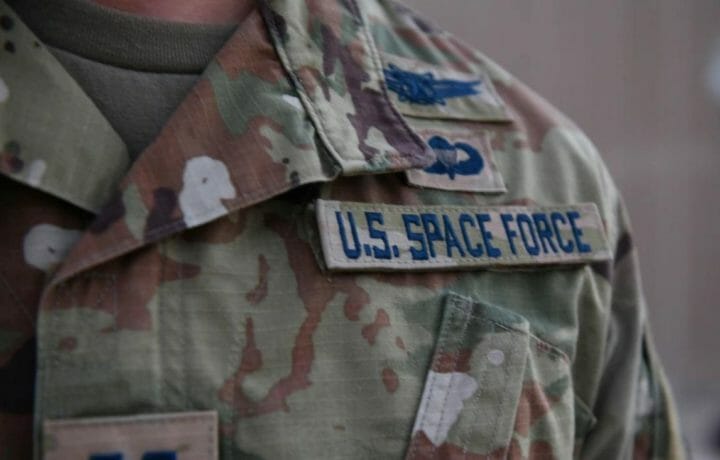Call it a “failure to launch.” The governors of 48 U.S. states, along with those of five U.S. territories have called upon the Senate Armed Services Committee (SASC) to reject a Pentagon proposal to shift hundreds of serving Air National Guard personnel to the United States Space Force, the sixth and newest branch of the U.S. military.
In a letter to Secretary of Defense Lloyd Austin, the governors said the legislation disregards gubernatorial authorities regarding the National Guard and undermines 100 years of precedent as well as national security and military readiness.
Only the governors of Florida, which has Space Force units; and Texas, which does not, did not sign the letter.
“Ensuring the National Guard is adequately equipped with resources and capabilities to serve as the operational combat reserve for national security missions and to support domestic emergencies is among the National Governors Association’s highest priorities. It is imperative that Governors retain the authority laid out in United States Code (U.S.C.) Title 32, Section 104. LP480 undercuts this critical authority by allowing a transfer of covered space units from the National Guard to the United States Space Force without abiding by Title 32 or Title 10,” the governors wrote.
“Specifically, section 18238 of Title 10 states that there should be no removal or withdrawal of a unit of the Air National Guard without consultation and approval from Governors. Additionally, section 104 of Title 32 states there is to be no change in the branch, organization, or allotment of National Guard units within a state or territory without the approval of its Governor,” the letter added.
Move of Personnel
Earlier this spring, the U.S. Air Force submitted a proposal to congress that would waive federal law requiring that no change in the branch, organization, or allotment of a guard unit located entirely within a state could be made without the approval of its respective governor.
Air Force Secretary Frank Kendall had argued the move would not weaken governors’ control over any Guard units because the situation was a unique one-off, and it would only affect a very small portion of the Guard’s personnel.
As reported by Air & Space Forces magazine, there are approximately 14 space units in seven states with 1,000 Air National Guardsmen in total. By contrast, the Army and Air National Guard combined have more than 430,000 personnel with hundreds of units.
“We’re talking about a few hundred people,” Kendall told reporters on April 10. “The numbers for any state are less than, I think, two percent of their Guard people and there are only a handful of states are affected.”
However, the 53 governors – most of whom don’t even have any Space Force units – argued the move could have much wider implications. The state leaders suggested the changes would undermine longstanding partnerships, precedence, military readiness, and operational efficacy, while also negatively affecting the important relationships between governors and the Department of Defense (DoD) at a time when there needs to maintain full trust and confidence between the two to meet the growing threats posed by the era of strategic competition as well as natural disasters.
Battle Lines Being Drawn
U.S. lawmakers are now split on the proposal to waive the federal requirements. Colorado’s two Democratic senators, Michael Bennet and John Hickenlooper, along with fellow state Democrat Rep. Jason Crow, have come out as opposed to the legislative proposal.
Bennet and Hickenlooper in January co-sponsored a bill with Sens. Marco Rubio (R-Fla.), Laphonza Butler (D-Calif.), Alex Padilla (D-Calif.), James Risch (R-Idaho), Marsha Blackburn (R-Tenn.), Mike Crapo (R-Idaho), Rick Scott (R-Fla.), and Kyrsten Sinema (I-Ariz.), to instead create a separate Space National Guard. Scott is a member of the SASC.
However, Rep. Mike Rogers (R-Ala.), who chairs the House Armed Services Committee, supports the proposal.
Proponents of a Space National Guard have argued that Air National Guard units who do space missions are “orphaned” under the current arrangement and suggested that creating a separate Space Guard would mostly be an administrative move with few costs. In addition, Guard members would remain available for state-level missions like humanitarian relief or natural disaster response.
Kendall, other Department of the Air Force leaders, and even the White House have taken the view that a separate Guard would create unnecessary and costly bureaucracy and that space is inherently a federal mission, so Guards do not need space units. Recent legislation has allowed the Space Force to have part-time personnel, and leaders say that a unique setup will ease the transition for Guard members.
A third option calls to leave the Air National Guard units as they are, with minimal changes to better formalize their relationships with the Space Force.
Congress directed the U.S. Air Force to study all three options and deliver a report with recommendations by March 1.
Secretary Kendall said last month that the report will be delivered soon but the results were already clear – and that it called for folding Guard units into the Space Force is the preferred solution, while the creation of a fully separate Space National Guard was seen as the worst option.
“It doesn’t make any sense,” Kendall suggested. “It’s going to cost to administer. There is not in my mind, any expectation that it will grow. And it’s going to be administratively difficult. So I don’t think that’s a very attractive option for a number of reasons.”




